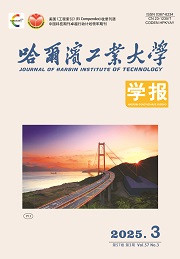| 引用本文: | 张杰,梅宁,李冬,刘孟浩,王刘煜,杨航.低温高铁锰氨地下水净化工艺中氨氮去除途径[J].哈尔滨工业大学学报,2020,52(6):85.DOI:10.11918/201906146 |
| ZHANG Jie,MEI Ning,LI Dong,LIU Menghao,WANG Liuyu,YANG Hang.Removal route of ammonia nitrogen in purification process of low temperature groundwater containing high concentration of iron and manganese associated ammonia nitrogen[J].Journal of Harbin Institute of Technology,2020,52(6):85.DOI:10.11918/201906146 |
|
| 摘要: |
| 为探究氨氮的去除途径,在某除铁锰氨地下水水厂,用中试模拟滤柱开展了低温(5~6 ℃)高铁锰氨[Fe(Ⅱ) 9.2~15.1 mg/L,Mn(Ⅱ) 0.6~1.4 mg/L,NH+4-N 0.9~2.0 mg/L]净化工艺运行试验.结果表明:滤柱在启动初期就表现出对氨氮良好的去除效果,通过沿程分析及成熟滤料和反冲洗泥的吸附试验可知,当进水氨氮质量浓度约为1.1 mg/L时,氨氮主要经滤层上部的铁锰氧化物吸附去除,而经生物作用去除的比例很小.为进一步探究滤柱对氨氮的生物作用和吸附作用,梯度调节进水氨氮质量浓度,随着进水氨氮质量浓度的升高,经生物作用去除的氨氮增加.在此进水铁锰质量浓度条件下,在滤层最上部20 cm范围内通过铁锰氧化物吸附去除的氨氮约为1 mg/L. |
| 关键词: 低温 高铁锰 氨氮 生物作用 吸附 铁锰氧化物 |
| DOI:10.11918/201906146 |
| 分类号:X703.1 |
| 文献标识码:A |
| 基金项目:北京高校卓越青年科学家计划(BJJWZYJH01201910005019);国家自然科学基金(51678006) |
|
| Removal route of ammonia nitrogen in purification process of low temperature groundwater containing high concentration of iron and manganese associated ammonia nitrogen |
|
ZHANG Jie1,2,MEI Ning1,LI Dong1,LIU Menghao1,WANG Liuyu1,YANG Hang2
|
|
(1.Key Laboratory of Beijing for Water Quality Science and Water Environment Recovery Engineering (Beijing University of Technology), Beijing 100124, China; 2.State Key Laboratory of Urban Water Resource and Environment(Harbin Institute of Technology), Harbin 150090, China)
|
| Abstract: |
| To explore the removal route of ammonia nitrogen, a biological purification process operation test for high concentration of iron and manganese associated ammonia nitrogen [Fe(Ⅱ) 9.2-15.1 mg/L, Mn(Ⅱ) 0.6-1.4 mg/L, NH+4-N 0.9-2.0 mg/L] was carried out at low temperature (5-6 ℃) in a groundwater plant for iron, manganese, and ammonia nitrogen removal. Results show that the filter column had good removal effect of ammonia nitrogen at the initial stage of start-up. The analysis along the process and the adsorption test of mature filter material and backwash sludge show that when the influent ammonia nitrogen was about 1.1 mg/L, the ammonia nitrogen was mainly removed by the iron and manganese oxides in the upper part of the filter layer, and the removal rate by biological action was very small. In order to further explore the biological and adsorption effects of filter column on ammonia nitrogen, gradient was used to adjust the concentration of ammonia nitrogen in influent. With the increase of the influent ammonia nitrogen concentration, the ammonia nitrogen removal by biological action increased. Under the condition of influent iron and manganese concentration, the ammonia nitrogen removal by iron and manganese oxides adsorption was about 1 mg/L in the upper 20 cm range of the filter. |
| Key words: low temperature high concentration of iron and manganese ammonia nitrogen biological action adsorption iron and manganese oxides |







